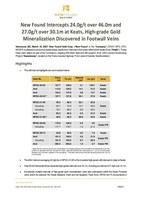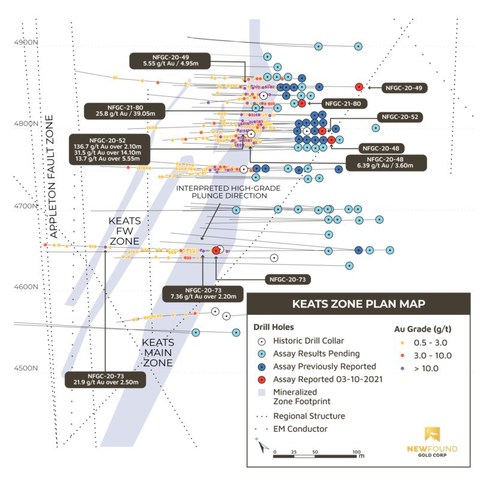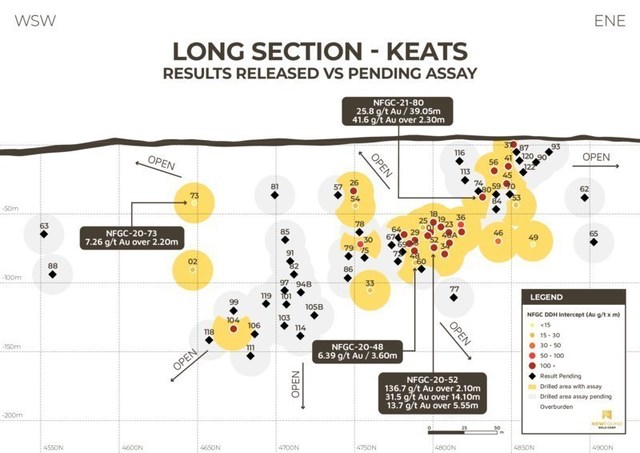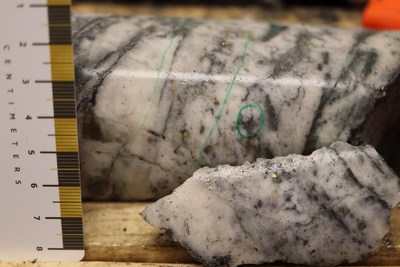New Found Intercepts 24.0g/t over 46.0m and 27.0g/t over 30.1m at Keats, High-grade Gold Mineralization Discovered in Footwall Veins
New Found Gold Corp. announced promising partial assay results from its drilling at the Keats Zone, part of the 200,000m diamond drill program at the Queensway Project. Significant intervals of high-grade gold were found, notably in hole NFGC-21-80, which averaged 24.0g/t Au over 46m. Other holes, including NFGC-20-52 and NFGC-20-73, also reported multiple high-grade intercepts. The ongoing drilling aims to explore high-grade gold mineralization further along the Keats Baseline Fault and adjacent veins. Greg Matheson, COO, emphasized the strong potential for additional discoveries.
- NFGC-21-80 reported a broad interval averaging 24.0g/t Au over 46m, marking the highest grade intercept to date.
- Hole NFGC-20-52 highlighted multiple intervals exceeding 30g/t Au, indicating strong mineralization.
- Drilling has identified additional high-grade veins in the Keats Footwall, suggesting further exploration potential.
- None.
VANCOUVER, BC, March 10, 2021 /PRNewswire/ - New Found Gold Corp. ("New Found" or the "Company") (TSXV: NFG) (OTC: NFGFF) is pleased to announce partial assay results from intervals in five holes drilled at the Keats Zone ("Keats"). These holes were drilled as part of the Company's ongoing 200,000m diamond drill program at its
Highlights
- The drill interval highlights are summarized below:
Hole No. | From | To (m) | Interval | Au (g/t) | Zone |
NFGC-20-52 | 107.7 | 109.8 | 2.1 | 136.7 | Keats |
And | 114.4 | 128.5 | 14.1 | 31.5 | Keats |
And | 132.2 | 137.8 | 5.6 | 13.7 | Keats |
NFGC-20-52** | 107.7 | 137.8 | 30.1 | 27.0 | Keats |
NFGC-21-80 | 49.5 | 88.5 | 39.1 | 25.8 | Keats |
Including | 62.7 | 72.8 | 10.1 | 58.5 | |
Including | 78.7 | 88.5 | 9.9 | 39.5 | |
And | 93.2 | 95.5 | 2.3 | 41.6 | Keats |
NFGC-21-80** | 49.5 | 95.5 | 46.0 | 24.0 | Keats |
NFGC-20-49 | 175.9 | 180.9 | 5.0 | 5.6 | Keats FW |
Including | 177.7 | 178.7 | 1.0 | 21.2 | |
NFGC-20-73 | 25.8 | 28.0 | 2.2 | 7.3 | Keats |
And | 191.5 | 194.0 | 2.5 | 21.9 | Keats FW |
Including | 191.5 | 192.2 | 0.7 | 83.4 | |
And | 292.4 | 293.8 | 1.4 | 2.7 | Keats FW |
* Note that the host structures are interpreted to be steeply dipping and true widths are estimated to be |
- The 46m interval averaging 24.0g/t Au in NFGC-21-80 is the broadest high-grade drill intercept to date at Keats.
- Hole 20-52 intersected three separate high-grade intervals over 30.1m, including an interval of 31.5g/t over 14.1m.
- Importantly multiple intervals of high-grade gold mineralization were also intercepted within the Keats Footwall veins which lie between the Keats Baseline Fault and the Appleton Fault Zone. NFGC-20-73 encountered a footwall vein at 191.5m down hole that returned 21.9g/t Au over 2.50m including a 0.65m interval displaying visible gold that assayed 83.4 g/t Au. NFGC 20-49 encountered a footwall vein at 178m down hole that returned 5.55 g/t Au over 4.95m including an interval displaying visible gold that assayed 21.2g/t Au over 1.0m.
- NFGC-20-73 was terminated at 293.8m with the final 1.35m interval returning 2.73g/t Au. This hole is now being deepened to test the extent of this gold mineralization.
Greg Matheson, Chief Operating Officer of New Found, stated: "Holes 52 and 80 provide further confirmation of the impressive widths of high-grade, near surface gold mineralization in the Keats Baseline Fault. Drilling is now focused on stepping out to the north, south and to depth. Drilling to date at Keats has also encountered multiple veins in the footwall of the Keats Baseline Fault, typically returning assays in the 0.5 to +3.0g/t range. The high-grade intervals recently encountered in this secondary veining is very encouraging. The initial high-grade discovery hole (92.9g/t over 19m in NFGC-19-01) in the Keats Baseline Fault was drilled below veining that returned multi-gram assays and that occurred within much longer intervals (up to +100m) of halo gold mineralization. In addition to the high-grade assays reported, Hole NFGC-20-73 returned a cumulative 125m that assayed above 0.1 g/t, indicating a broad anomalous gold halo within the Keats Baseline footwall. We will continue to step-out on these intervals to test for additional zones of high-grade gold mineralization between the Keats Baseline fault and the Appleton Fault."
Table 2: Summary of results reported in this news release
Hole No. | From (m) | To (m) | Interval | Au (g/t) | Zone |
NFGC-20-48 | 129.0 | 132.6 | 3.6 | 6.39 | Keats |
And | 141.0 | 143.2 | 2.2 | 1.15 | Keats |
And | 164.5 | 167.1 | 2.6 | 1.38 | Keats FW |
NFGC-20-49 | 175.9 | 180.9 | 5.0 | 5.55 | Keats FW |
Including | 177.7 | 178.7 | 1.0 | 21.2 | |
NFGC-20-52 | 107.7 | 109.8 | 2.1 | 136.7 | Keats |
And | 114.4 | 128.5 | 14.1 | 31.5 | Keats |
And | 132.2 | 137.8 | 5.6 | 13.7 | Keats |
NFGC-20-73 | 25.8 | 28.0 | 2.2 | 7.26 | Keats |
Including | 26.6 | 27.0 | 0.5 | 30.1 | |
And | 191.5 | 194.0 | 2.5 | 21.9 | Keats FW |
Including | 191.5 | 192.2 | 0.7 | 83.4 | |
And | 292.4 | 293.8 | 1.35 | 2.73 | Keats FW |
NFGC-21-80 | 49.5 | 88.5 | 39.1 | 25.8 | Keats |
Including | 62.7 | 72.8 | 10.1 | 58.5 | |
Including | 78.7 | 88.5 | 9.9 | 39.5 | |
And | 93.2 | 95.5 | 2.3 | 41.6 | Keats |
*Note that the host structures are interpreted to be steeply dipping and true widths are estimated to be |
Table 3: Details of drill holes reported on in this news release
Hole No. | Azimuth (°) | Dip (°) | Length (m) | UTM E | UTM N |
NFGC-20-48 | 300 | -45 | 198 | 658 247 | 5 427 430 |
NFGC-20-49 | 300 | -45 | 234 | 658 309 | 5 427 468 |
NFGC-20-52 | 300 | -45 | 192 | 658 243 | 5 427 445 |
NFGC-20-73 | 300 | -45 | 297 | 658 058 | 5 427 383 |
NFGC-21-80 | 300 | -45 | 200 | 658 239 | 5 427 486 |
Sampling, Sub-sampling and Laboratory
True widths of the new exploration intercepts reported in this press release have yet to be determined but are estimated to be
Qualified Person
The technical content disclosed in this press release was reviewed and approved by Greg Matheson, P. Geo., Chief Operating Officer and a Qualified Person as defined under National Instrument 43-101. Mr Matheson consents to the publication of this announcement dated March 10, 2021 by New Found Gold. Mr. Matheson certifies that this announcement fairly and accurately represents the information for which he is responsible.
About New Found Gold Corp.
New Found holds a
Please see the Company's website at www.newfoundgold.ca and the Company's SEDAR profile at www.sedar.com.
Acknowledgements
New Found acknowledges the financial support of the Junior Exploration Assistance Program, Department of Natural Resources, Government of Newfoundland and Labrador.
Contact
To contact the Company, please visit the Company's website, www.newfoundgold.ca and make your request through our investor inquiry form. Our management has a pledge to be in touch with any investor inquiries within 24 hours.
New Found Gold Corp.
Per: "Craig Roberts"
Craig Roberts, P.Eng., Chief Executive Officer
Email: croberts@newfoundgold.ca
Phone: (604) 562 9664
Neither the TSX Venture Exchange nor its Regulation Services Provider (as that term is defined in the policies of the TSX Venture Exchange) accepts responsibility for the adequacy or accuracy of this release.
Forward-Looking Statement Cautions
This press release contains certain "forward-looking statements" within the meaning of Canadian securities legislation, relating to further the exploration and drilling on the Company's Queensway gold project in Newfoundland. Although the Company believes that such statements are reasonable, it can give no assurance that such expectations will prove to be correct. Forward-looking statements are statements that are not historical facts; they are generally, but not always, identified by the words "expects," "plans," "anticipates," "believes," "intends," "estimates," "projects," "aims," "potential," "goal," "objective," "prospective," and similar expressions, or that events or conditions "will," "would," "may," "can," "could" or "should" occur, or are those statements, which, by their nature, refer to future events. The Company cautions that forward-looking statements are based on the beliefs, estimates and opinions of the Company's management on the date the statements are made, and they involve a number of risks and uncertainties. Consequently, there can be no assurances that such statements will prove to be accurate and actual results and future events could differ materially from those anticipated in such statements. Except to the extent required by applicable securities laws and the policies of the TSX Venture Exchange, the Company undertakes no obligation to update these forward-looking statements if management's beliefs, estimates or opinions, or other factors, should change. Factors that could cause future results to differ materially from those anticipated in these forward-looking statements include risks associated possible accidents and other risks associated with mineral exploration operations, the risk that the Company will encounter unanticipated geological factors, the possibility that the Company may not be able to secure permitting and other governmental clearances necessary to carry out the Company's exploration plans, the risk that the Company will not be able to raise sufficient funds to carry out its business plans, and the risk of political uncertainties and regulatory or legal changes that might interfere with the Company's business and prospects. The reader is urged to refer to the Company's reports, publicly available through the Canadian Securities Administrators' System for Electronic Document Analysis and Retrieval (SEDAR) at www.sedar.com for a more complete discussion of such risk factors and their potential effects.
![]() View original content to download multimedia:http://www.prnewswire.com/news-releases/new-found-intercepts-24-0gt-over-46-0m-and-27-0gt-over-30-1m-at-keats-high-grade-gold-mineralization-discovered-in-footwall-veins-301244520.html
View original content to download multimedia:http://www.prnewswire.com/news-releases/new-found-intercepts-24-0gt-over-46-0m-and-27-0gt-over-30-1m-at-keats-high-grade-gold-mineralization-discovered-in-footwall-veins-301244520.html
SOURCE New Found Gold Corp.
FAQ
What were the assay results for New Found Gold Corp. at the Keats Zone?
How does the assay data impact New Found Gold Corp. stock (NFGFF)?
When was the press release regarding New Found Gold Corp.'s drilling results issued?
What is the significance of the results from hole NFGC-21-80 for New Found Gold Corp.?












